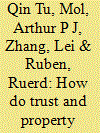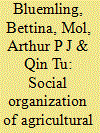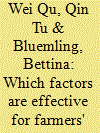|
|
|
Sort Order |
|
|
|
Items / Page
|
|
|
|
|
|
|
| Srl | Item |
| 1 |
ID:
110498


|
|
|
|
|
| Publication |
2011.
|
| Summary/Abstract |
Trust and property rights are generally considered to influence farmers' behavior regarding resource use and environmental management. Previous studies show that higher trust levels may enhance contributions to public goods. This paper investigates how trust and (land) property rights security influence the provision of one concrete public good: land protection through the Sloping Land Conservation Program in China. The analysis is based on household survey data from Ningxia Autonomous Region in China. From our questionnaire two trust factors are derived and distinguished, using factor analysis: general trust and kinship trust. Farm households are less likely to contribute to public goods when they perceive more secure land rights, but trust has mixed effects on public goods. The results show that general trust and kinship trust may rely on two opposite effects for influencing public goods provision. On the one hand, high levels of general trust may directly enhance people's willingness to provide contributions to public goods (by reduced likelihood to reconvert forest land) when farmers are aware of the positive environmental effects of the program, that's the public goods effect. On the other hand, general trust may also make it more likely that people invest more in their own private goods to pursue their own welfare (a more likely reconversion of forest land to arable land), that's the private goods effect. The final outcome depends on the size and direction of both effects. Compared to general trust, kinship trust is more inward-looking and self- or group-interested compared to more reciprocal general trust. Thus, unlike general trust, kinship trust may have no significant public goods effect on the provisioning of public goods.
|
|
|
|
|
|
|
|
|
|
|
|
|
|
|
|
| 2 |
ID:
126473


|
|
|
|
|
| Publication |
2013.
|
| Summary/Abstract |
While for wind, solar energy or hydropower, energy supply happens directly from the source to the wind wheels, hydropower turbines or solar panels, in the case of biogas, energy production cannot directly take from the energy source, organic matter, but depends on the institutional structures and farmers' practices involved for making energy available. With the production of bioenergy in rural areas, practices within agriculture are transformed, requiring new ways of organizing production processes. Research has left the question largely unanswered of how agricultural biogas production and use are - and can best be - organized within rural society. Which kinds of social organization exist, how are these embedded in existing agricultural institutions and practices, and how do these systems function? Under which conditions may the different kinds of social organization of biogas production and use work sustainably? This introduction article to the Special Issue "The social organization of agricultural biogas production and use" presents a framework for analysing the different kinds of social organization of biogas production and use presented hereafter. Analysis parameters are the supply network, distribution network, distribution of benefits, social boundaries of the system (accessibility) and scale. Using these parameters, the Special Issue articles are outlined.
|
|
|
|
|
|
|
|
|
|
|
|
|
|
|
|
| 3 |
ID:
126475


|
|
|
|
|
| Publication |
2013.
|
| Summary/Abstract |
The Chinese government since 1995 has carried out programs for the construction of household biogas digesters in the Chinese countryside. Despite the large governmental spending in the building of household biogas digesters, only 12.16% of the households suitable to produce and use biogas, have built a digester (Li, 2009). This article asks which factors on the household level may be important for the decision whether or not to build a biogas digester. Based on a survey with 1227 households from Guangxi, Hubei, Shandong and Gansu provinces, results of a binary Probit Model show that the governmental promotion of biogas has a significant effect on households' decision. The question arises which households may, if governmental programs were to be running out, be most likely to construct a household biogas digester? The household head's age, the number of household members staying at home, the total household income and the subjective discount rate of the respondents are significant factors in a farm household's decision to build a biogas digester. However, also agro-climatic conditions reveal to be decisive, which is why technical solutions for tackling the low productivity of biogas digesters in cold regions may need to be further considered.
|
|
|
|
|
|
|
|
|
|
|
|
|
|
|
|
|
|
|
|
|